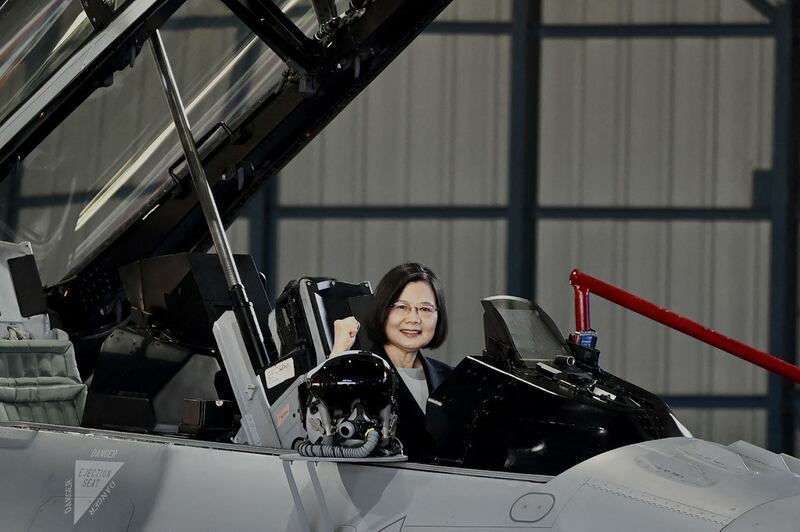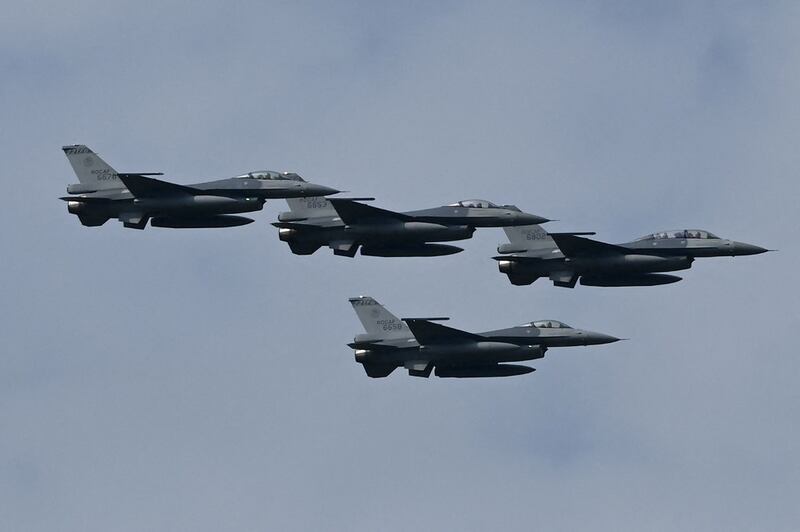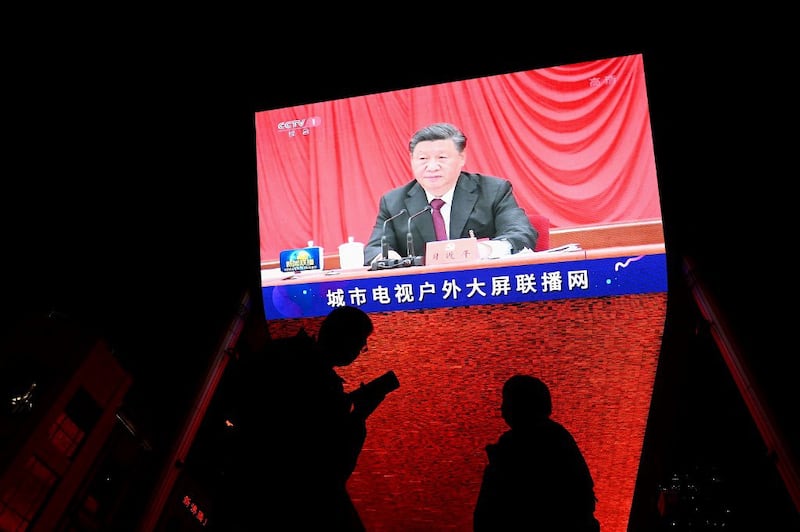U PDATED AT 7:30 p.m. EST on 2021/11/29
In a new book, Rush Doshi argues that dating back to the 1980s, China has had a grand strategy to displace the American-led global order.
Doshi is the Director for China on the Biden administration’s National Security Council.
His views are summed up in a new book titled The Long Game: China's Grand Strategy to Displace American Order.
The book was written well before Doshi got his new appointment. So it doesn’t necessarily indicate how many of the ideas contained therein will be adopted by the Biden administration.
In the meantime, the United States has “mapped out a path to compete, deter, and win” if China’s actions become more aggressive, says the U.S. Air Force’s Chief of Staff Charles Q. Brown Jr.
Most experts seem to agree that calling current tensions between the U.S. and China "a new Cold War" goes too far.
But Joseph S. Nye, known for his writings on soft power, warns of the risks of what he calls “the sleepwalker syndrome,” which is how the world slipped into conflict in 1914 on the eve of the First World War.
"The fact that the Cold War metaphor is counterproductive as a strategy does not rule out a new Cold War," he said.
"We may get there by accident."
Meanwhile, Gen. Mark A. Milley, chairman of the U.S. Joint Chiefs of Staff, said China’s testing of a hypersonic missile this summer “came very close” to a “Sputnik moment for the U.S.”
The New York Times said in a report published on October 27 that such tests "could revive fears of a Cold War-like arms race."
It’s worth recalling that the Soviet Union launched Sputnik, the first man-made satellite to orbit the earth, on October 4, 1957.
As the commentator Fareed Zakaria notes, “The fact that Moscow got there first was a huge shock to Americans.”

Fighter planes and trade pressure
The biggest focus of recent attention came in early October when Chinese air force planes flew close to islands lying southwest of Taiwan.
At the same time, China’s pressure on Taiwan now extends into the economic realm
In a commentary written for the Washington, D.C.-based Jamestown Foundation, Christina Lai notes that China’s General Administration for Customs has imposed bans on imports of Taiwanese wax apples.
It claimed that pests were found on multiple occasions in the apples.
This month China launched a nationwide probe into the activities of companies under Taiwan's Far Eastern Group, which is a donor to Taiwan's ruling Democratic Progressive Party (DPP), the party of president Tsai Ing-wen.
Some of the companies had been fined for environmental and other violations, amid a crackdown on "diehard secessionists."
"We will never allow [companies] that support Taiwan secession ... or those that bite the hand that feeds them, to make money [here]," China's Taiwan Affairs Office spokesman Zhu Fenglian told reporters.
But most importantly, China has greatly increased their military probing of Taiwan’s Air Defense Identification Zone (ADIZ).
This included the largest single intrusion on Oct. 4, which involved 56 warplanes, according to the publication Taiwan News, an English-language online newspaper published in Taiwan.

Ready for war?
On Nov. 9, China flew combat aircraft drills near Taiwan in an apparent reaction to a visit by a number of Congressmen to Taiwan. They flew to Taiwan in a military aircraft.
According to The Washington Post, U.S. officials said that such visits to Taiwan are "fairly routine" and often make use of military aircraft.
Experts are asking how Taiwan might react if China were to seize Taiwanese-held offshore islands in the South China Sea.
Evidence suggests that the island nation’s military is not well prepared for such an eventuality.
In a comprehensive report published on October 26, a report in the Wall Street Journal concluded that Taiwan's military isn't ready for war.
The problems besetting Taiwan’s military ranks, they say, include poor preparation and low morale among the roughly 80,000 Taiwanese who are conscripted each year as well as among nearly 2.2 million reservists.
In a lengthy interview with CNN recently, Taiwan’s President Tsai Ing-Wen acknowledged such problems when she said that Taiwan would have to expedite long-needed military reforms.
A group of experts has concluded that the United States would have few options if China were to seize islands administered by Taiwan.
That possible scenario was recently examined in a report prepared by four foreign policy experts with the Center for New American Security (CNAS), a Washington D.C.-based think tank.
Their report, published on October 26, raises the question of what would happen, for example, if Chinese forces invaded the Pratas Islands, capturing the 500 Taiwanese troops who are based there.
It would pose a challenge for the U.S. Defense Department that “many China-watchers view as increasingly plausible,” the report says.

Glasgow deal
The report comes at a time of heightened tension between the United States and China, with the U.S. opposing China’s military expansion in the region and China calling on the Defense Department to cut ties with Taiwan.
But relations between the U.S. and China appear to have stabilized to a degree following agreements reached at the United Nations COP26 climate summit in Glasgow.
The U.S, and China during the final days of the summit made a surprise announcement that they would cooperate on accelerating a transition to cleaner energy.
President Biden, speaking at a town hall meeting last week, said that “we have a commitment” to defend Taiwan. But the White House then issued a statement clarifying that the U.S. defense relationship with Taiwan is guided by the “Taiwan Relations Act,” which was signed into law in 1979.
It also promises to provide the island nation with defensive weapons and states that it will maintain the capacity to react to “any resort to force or forms of coercion” that would endanger security on Taiwan.
After the Chinese communists won a civil war in China in 1949, their anti-communist opponents fled to Taiwan.
China has claimed the island as its own territory ever since, insisting that this would be a matter of “reunification,” although mainland China and Taiwan were never united.
Former Australian Prime Minister Tony Abbot visited Taiwan in early October, which infuriated Beijing.
Taiwan as flashpoint
In a recent interview conducted at the U.S.-based Wilson Center in Washington, D.C., Abbot said that China was seeking “hegemony” in the Indo-Pacific region.
“If there are war drums beating in the Pacific, it’s coming from China,” he said.
What is behind China’s moves?
According to Abbot, first there is a domestic political dimension. In his view, China’s leader Xi Jinping is causing tension partly to get people to “rally behind the flag.”
Second, Abbot says, “China sees the U.S. as a declining power” and that in its view “eventually the region will recognize the trends of history and Chinese hegemony.”
According to Gideon Rachman, global affairs commentator for the Financial Times, in a column published on Nov. 9, Chinese media have been portraying the West and the United States in particular as nations in inexorable decline."
Former U.S. Army colonel Andrew Bacevich and Australian scholar Hugh White have called for the United States to simply declare that it will not defend Taiwan from an invasion by China.
Since such an event would have the potential to expand into a U.S.-China nuclear exchange, they have called for the United States to simply declare that it will not defend Taiwan from an invasion by China.
These experts argue that a Chinese occupation of Taiwan would have no broader impact on U.S. ties with its treaty allies including Japan, the Philippines, South Korea, and Thailand and would in no way weaken their security.
In contrast with this view, in his book The Strategy of Denial, former deputy assistant secretary of defense Elbridge A. Colby argues that in any hot conflict the United States must defend Taiwan.
Colby contends that together with its allies, the United States could both win such a conflict and prevent it from spreading beyond the South China Sea.
But it appears that China may have begun to overestimate the strength of its military power relative to that of the United States.
That could, of course, lead to dangerous miscalculations on Beijing’s part.
Dan Southerland is RFA's founding Executive Editor.
CORRECTION : F ormer ambassador Chas Freeman was originally listed as advocating the United States declaring that it would not defend Taiwan from Chinese attack. He rejects that characterization of his position, and his name has been removed from this commentary.
